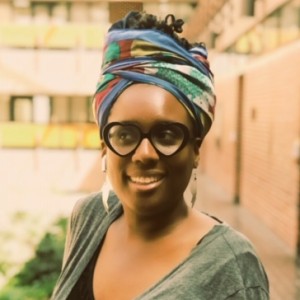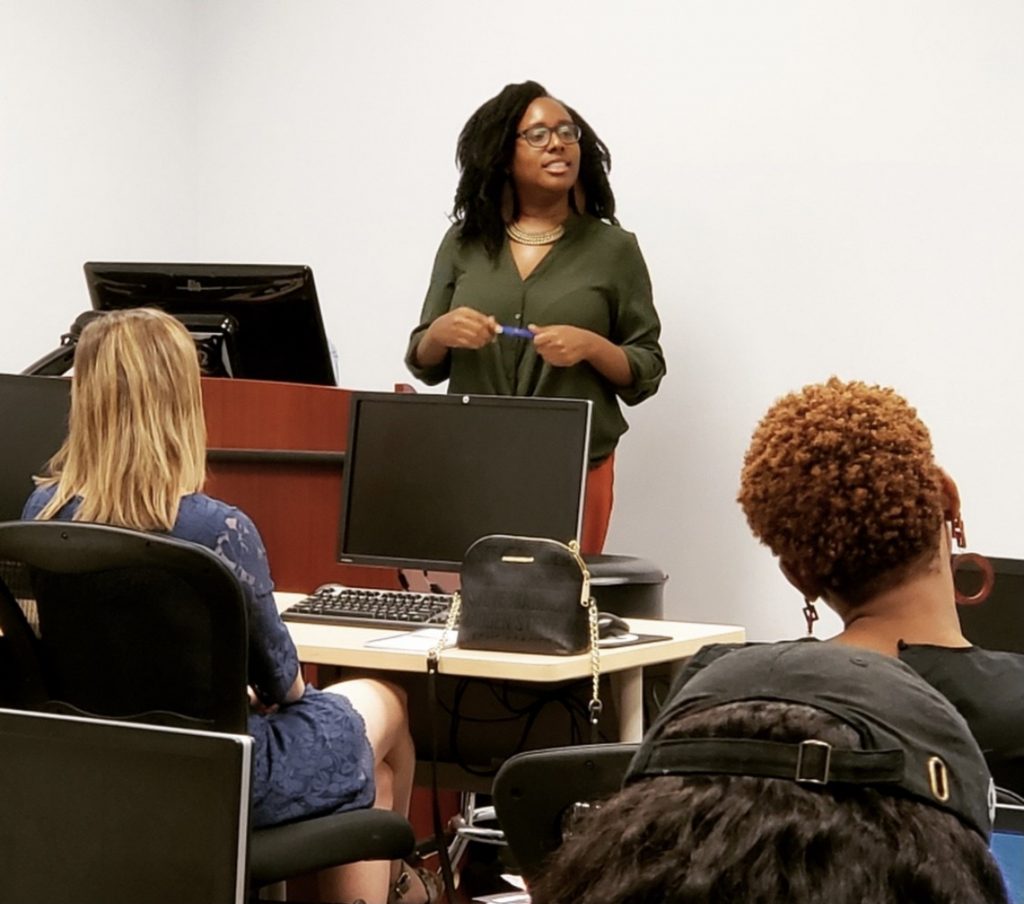CJC Doctoral Student Explores Black Faculty, Staff and Student Experiences at UF
By Lenore Devore, B.S. Journalism 1984

Exposed to various cultures at a small, diverse performing arts high school in Atlanta, University of Florida College of Journalism and Communications doctoral student Yewande O. Addie decided to continue on a path of multiculturalism to learn more about herself — and use storytelling and research to affect changes in society.
Thanks to the help of faculty members and two $60,000 Racial Justice Research Fund grants from the University of Florida, she is hoping her research will have a meaningful impact on Black faculty, staff and student experiences at UF. One project is focused on improvements to the hiring and retaining of black faculty. The second project, of which she is co-principal investigator, highlights the opportunities and impediments Black students face on campus.
The student-focused project was inspired by a digital archive idea she hatched in response to Nigeria being added to a national travel-ban list. The recipient of a 2019-2020 Fulbright U.S. Student Program Grant, Addie was planning to travel to Nigeria to do research when the pandemic hit. Half Nigerian herself, she was encouraged by an African Studies faculty member to consider repurposing and expanding the idea to examine the biases and anti-Black racism on campus following a year of civil unrest.
“Instead of focusing on African student experiences alone, I thought it would be relevant to see what the temperature was like for Black students at large at UF,” she said. The research will be used to develop creative material that showcases Black voices on campus and encourages the administration to earnestly work toward making UF a more welcoming environment for all.
As a leader among research universities, UF is in a position to set a precedent on how other universities treat students of color, Addie said. She hopes the administration takes the suggestions gleaned from the project seriously, resulting in some sort of change or initiative.

In April 2021, Addie and her colleagues launched The Black Student Storytelling Project to showcase first-person narratives from Black students at UF. Students are invited to submit their personal stories, which are uploaded as audio files for public consumption. She hopes the stories “elicit some sort of academic product or research that can be contributed to the body of how we think about Black students in higher education.”
Addie earned her bachelor’s degree in journalism at Florida A&M just as the industry started changing, prompting her to pivot toward history. “I see a connection between the journalism of yesteryear informing the way we think about the past and think about the future.”
She received her master’s degree in liberal studies history from Clayton State University, then took a break and joined the Peace Corps. She moved to Panama, where she was integrated into another culture. “Learning about that taught me so much about myself and it continued to drive my motivation and interest around culture and the way people communicate.”
Appointed by the Barack Obama administration to serve as a press assistant in the U.S. Department of Agriculture, she recognized the subcultures in one department — all functioning for the American people. She learned about everything from the research culture, farmers and foreign markets to the forest service and what it takes to be labeled organic. “You are communicating all these different messages in support of many different cultures but with a common goal in mind.”
She returned to Florida to be with her family after her father died. During that time, she worked as a special needs elementary school teacher and volunteered as a media specialist. In the second year of her doctoral program in communications, with an emphasis in culture and health, she started working toward a master’s in public health, which she earned in December 2019.

Addie also does research in health care. Her “Perceptions of Care” study investigated doctor-patient communication in a university healthcare setting. The study focused on sexual and gender minorities, especially LGBTQ students. “If you didn’t have the most favorable coming-out experience, that will color the way you talk to a physician, potentially.”
Healthcare workers who work in student health should communicate in a manner that accommodates a student’s needs, she said. “There is an important relationship between a person’s health outcomes and the type of communication that happens with their doctors.”
Whether healthcare or educational disparities, “there is a direct link to historical inequities,” Addie said.
She hopes the research she’s involved in leads to action. “I would love for more people to have greater understanding, but I think the greater goal is to encourage a response. … You can’t fully understand me if you don’t vote my interest, if you don’t support policies and policy makers that have my interest in mind, if you don’t challenge things when you have an opportunity to or you have the platform to be able to say things that could impact my livelihood or the livelihood of those I care about.”
Category: College News, Profiles
Tagged: Black student experience Uf Racial Justice Research Fund Yewande O. Addie
Subscribe to our News Digest


